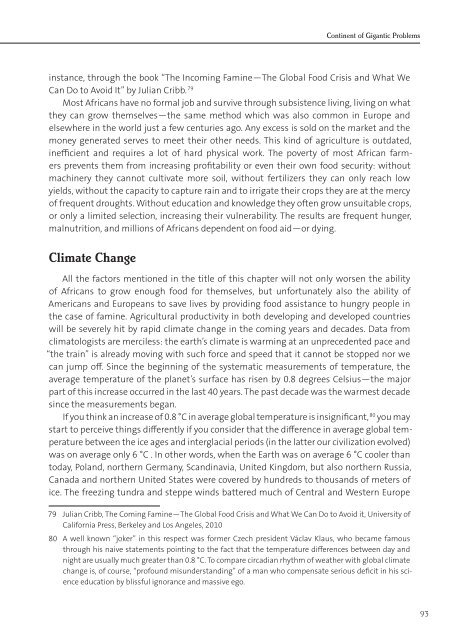Giant_and_Dwarf-FIN
Giant_and_Dwarf-FIN
Giant_and_Dwarf-FIN
Create successful ePaper yourself
Turn your PDF publications into a flip-book with our unique Google optimized e-Paper software.
Continent of Gigantic Problemsinstance, through the book “The Incoming Famine—The Global Food Crisis <strong>and</strong> What WeCan Do to Avoid It” by Julian Cribb. 79Most Africans have no formal job <strong>and</strong> survive through subsistence living, living on whatthey can grow themselves—the same method which was also common in Europe <strong>and</strong>elsewhere in the world just a few centuries ago. Any excess is sold on the market <strong>and</strong> themoney generated serves to meet their other needs. This kind of agriculture is outdated,inefficient <strong>and</strong> requires a lot of hard physical work. The poverty of most African farmersprevents them from increasing profitability or even their own food security: withoutmachinery they cannot cultivate more soil, without fertilizers they can only reach lowyields, without the capacity to capture rain <strong>and</strong> to irrigate their crops they are at the mercyof frequent droughts. Without education <strong>and</strong> knowledge they often grow unsuitable crops,or only a limited selection, increasing their vulnerability. The results are frequent hunger,malnutrition, <strong>and</strong> millions of Africans dependent on food aid—or dying.Climate ChangeAll the factors mentioned in the title of this chapter will not only worsen the abilityof Africans to grow enough food for themselves, but unfortunately also the ability ofAmericans <strong>and</strong> Europeans to save lives by providing food assistance to hungry people inthe case of famine. Agricultural productivity in both developing <strong>and</strong> developed countrieswill be severely hit by rapid climate change in the coming years <strong>and</strong> decades. Data fromclimatologists are merciless: the earth’s climate is warming at an unprecedented pace <strong>and</strong>“the train” is already moving with such force <strong>and</strong> speed that it cannot be stopped nor wecan jump off. Since the beginning of the systematic measurements of temperature, theaverage temperature of the planet’s surface has risen by 0.8 degrees Celsius—the majorpart of this increase occurred in the last 40 years. The past decade was the warmest decadesince the measurements began.If you think an increase of 0.8 °C in average global temperature is insignificant, 80 you maystart to perceive things differently if you consider that the difference in average global temperaturebetween the ice ages <strong>and</strong> interglacial periods (in the latter our civilization evolved)was on average only 6 °C . In other words, when the Earth was on average 6 °C cooler thantoday, Pol<strong>and</strong>, northern Germany, Sc<strong>and</strong>inavia, United Kingdom, but also northern Russia,Canada <strong>and</strong> northern United States were covered by hundreds to thous<strong>and</strong>s of meters ofice. The freezing tundra <strong>and</strong> steppe winds battered much of Central <strong>and</strong> Western Europe79 Julian Cribb, The Coming Famine—The Global Food Crisis <strong>and</strong> What We Can Do to Avoid it, University ofCalifornia Press, Berkeley <strong>and</strong> Los Angeles, 201080 A well known “joker” in this respect was former Czech president Václav Klaus, who became famousthrough his naive statements pointing to the fact that the temperature differences between day <strong>and</strong>night are usually much greater than 0.8 °C. To compare circadian rhythm of weather with global climatechange is, of course, “profound misunderst<strong>and</strong>ing” of a man who compensate serious deficit in his scienceeducation by blissful ignorance <strong>and</strong> massive ego.93


